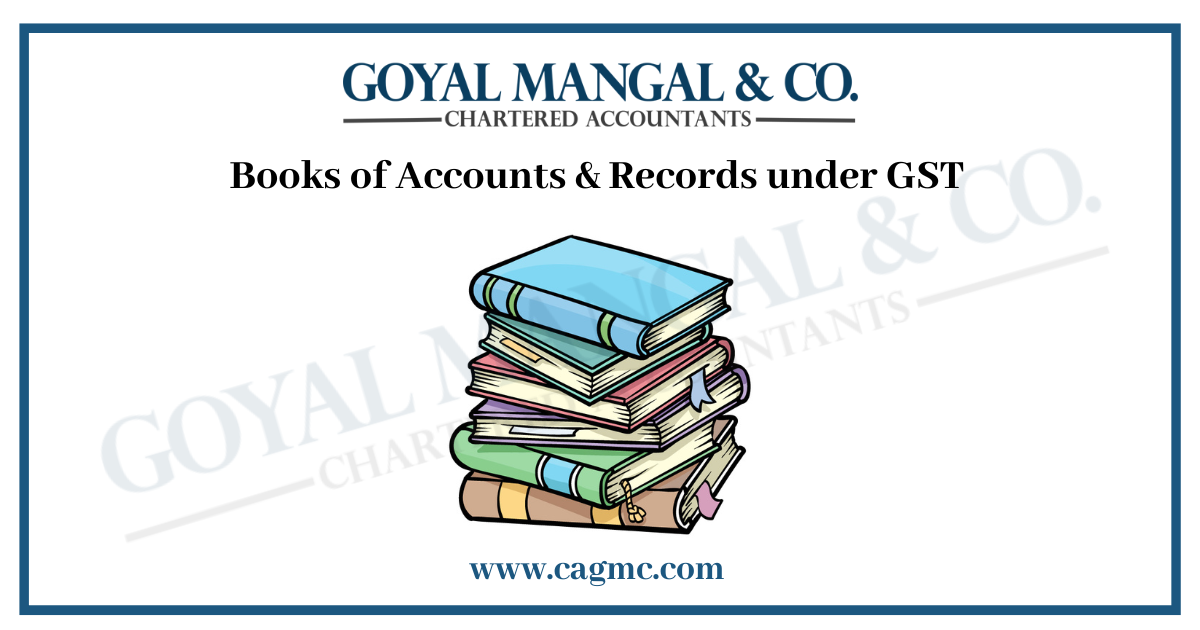
The Goods and Services Tax Act, 2017 mandate every registered person to maintain true and correct books and records. Failure to maintain them may result in the non-payer being punished with penalties and even confiscation of the goods. Let us discuss the books of accounts and records under GST.
Books of Accounts and Records
Every registered person shall keep books of account at the principal place of business and books of account relating to the other place of business mentioned in his certificate of registration and such books of account include any electronic form of data stored on any electronic device.
- No entries in registers, accounts, and documents shall be erased, deleted, or overwritten and all incorrect entries, other than of an official nature, will be evaluated in the attestation and then the correct entry will be made registered, and where registers and other documents are kept electronically, a log of each edited entry or are discharged.
- Each volume of books of accounts maintained manually by a registered person will be serially numbered.
- Unless proven otherwise, if these are documents, registers, or accounting books belonging to a registered person found on premises other than those shown in the certificate of registration shall be deemed to be conducted by the specified registered person.
Who has to maintain accounts under GST?
The following persons are responsible for keeping the specified records:
- Owner
- The operator of a warehouse or cellar or other place used for storing goods
- Every transporter
Any registered person whose turnover during the financial year exceeds the prescribed limit (2 crores) will have their accounts verified by a Chartered Accountant or Cost Accountant.
What type of records must be kept under GST?
Each registered person must keep records of:
- Manufacture or production of goods
- Inbound and outbound supplies of goods or services or both
- Inventory of goods
- Use of input tax discount
- Output tax due and paid a
- Other information that may be prescribed
What are the types of accounts that need to be maintained under GST?
In our article, we have listed the various accounts to be maintained and which businesses are required to maintain under GST.
For example, under GST, a trader has to maintain the following a/c (apart from accounts like purchase, sale, and inventory) –
- Input CGST
- Output CGST
- Input SGST
- Output SGST
- IGST
- Electronic Cash Book (to be maintained on Government GST Portal for GST Payment)
Accounting entries under GST
Despite initial transition issues, GST will bring clarity to many areas of business, including accounting and bookkeeping.
While the number of accounts is more apparent under GST, once you go through the accounting records, you will find that record-keeping is much simpler. One of the biggest advantages for a merchant is that he can offset the input tax on the service with the output tax on the sale.
Electronic Cash and Credit Book
Every registered taxpayer will have 3 books of account under GST which will be generated automatically on registration and will be maintained electronically.
- Electronic Cash Register– This ledger will serve as an electronic wallet. The taxpayer will have to deposit the money in his cash book (add money to the wallet). The money will be used to make the payment.
- Electronic Credit Book– Input tax rebates on purchases will be reflected here in three categories i.e. IGST, CGST, and SGST. The balance shown on this account can only be used by the taxpayer to pay the tax (not for interest, penalties, etc.)
- E-Liability Book– This book will show the total tax liability of the taxpayer after set-off for the month. This ledger will be filled in automatically.
Period for retention of accounts under GST
Under the GST Act, every registered taxable person must maintain books and records for a minimum period of 72 months (6 years). The period is calculated from the last date of submission of the annual return for the given year. The last day for submitting the annual report is December 31 of the following year.
Consequences of not keeping proper records
In the event of failure to maintain an accounting book under Section 35, clause 1, the relevant official shall determine the tax payable on unaccounted-for goods/services under the provisions of Section 73 or Section 74.
Further, under section 122(1) (xvi) on penalty, non-maintenance of books of accounts shall be punishable with the higher of INR 10,000 or the amount of applicable tax.
Failure to keep books in connection with confiscation provisions
The provision of Section 130 of the Central Goods and Services Tax Act, 2017 authorizes the confiscation of goods and also the imposition of penalty. Following the provisions of Section130 (1) (ii) the taxpayer incurs the forfeiture of the goods and a penalty according to Section 122 if the person does not account for the goods on which he is obliged to pay tax.
In this regard, reference may be made to the judgment of Metenere Ltd. vs. Union of India. In doing so, the primary argument related to the non-maintenance of books/records leading to the confiscation of goods.
Final words
Accounting plays an important role for the registered person in clarifying issues raised by tax authorities at a later stage. Therefore adequate during billing, the registered person will take care, especially of litigation, high-value transactions, complex agreements, etc.


